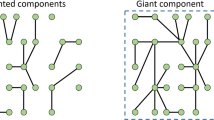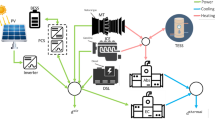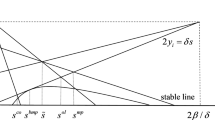Abstract
This paper applies mean-field game theory to dynamic demand management. For a large population of electrical heating or cooling appliances (called agents), we provide a mean-field game that guarantees desynchronization of the agents thus improving the power network resilience. Second, for the game at hand, we exhibit a mean-field equilibrium, where each agent adopts a bang-bang switching control with threshold placed at a nominal temperature. At equilibrium, through an opportune design of the terminal penalty, the switching control regulates the mean temperature (computed over the population) and the mains frequency around the nominal value. To overcome Zeno phenomena we also adjust the bang-bang control by introducing a thermostat. Third, we show that the equilibrium is stable in the sense that all agents’ states, initially at different values, converge to the equilibrium value or remain confined within a given interval for an opportune initial distribution.




Similar content being viewed by others
References
Achdou Y, Camilli F, Capuzzo Dolcetta I (2012) Mean field games: numerical methods for the planning problem. SIAM J Control Optim 50:77–109
Achdou Y, Capuzzo Dolcetta I (2010) Mean field games: numerical methods. SIAM J Numer Anal 48:1136–1162
Angeli D, Kountouriotis P-A (2012) A stochastic approach to “dynamic-demand” refrigerator control. IEEE Trans Control Syst Technol 20(3):581–592
Bagagiolo F (2001) An infinite horizon optimal control problem for some switching system. Discrete Contin Dyn Syst, Ser B 1(4):443–462
Bagagiolo F (2005) Optimal control of finite horizon type for a multidimensional delayed switching system. Discrete Contin Dyn Syst, Ser B 5(2):239–264
Bagagiolo F, Bauso D (2011) Objective function design for robust optimality of linear control under state-constraints and uncertainty. ESAIM Control Optim Calc Var 17:155–177
Bardi M (2012) Explicit solutions of some linear-quadratic mean field games. Netw Heterog Media 7:243–261
Bardi M, Capuzzo Dolcetta I (1997) Optimal control and viscosity solutions of Hamilton–Jacobi–Bellman equations. Birkhäuser, Boston
Başar T, Olsder GJ (1999) Dynamic noncooperative game theory. SIAM series in classics in applied mathematics. SIAM, Philadelphia
Bauso D, Tembine H, Başar T (2012) Robust mean field games with application to production of an exhaustible resource. In: Proceedings of 7th IFAC symposium on robust control design, Aalborg, Denmark
Bauso D, Zhu Q, Başar T (2012) Mixed integer optimal compensation: decompositions and mean-field approximations. In: Proceedings of 2012 American control conference, Montreal, Montreal, Canada
Callaway DS, Hiskens IA (2011) Achieving controllability of electric loads. Proc IEEE 99(1):184–199
Cardaliaguet P (2012) Notes on mean field games. P.-L. Lions’ lectures, Collège de France. https://www.ceremade.dauphine.fr/~cardalia/MFG100629.pdf
Couillet R, Perlaza SM, Tembine H, Debbah M (2012) Electrical vehicles in the smart grid: a mean field game analysis. IEEE J Sel Areas Commun 30(6):1086–1096
Eto JH, Nelson-Hoffman J, Torres C, Hirth S, Yinger B, Kueck J, Kirby B, Bernier C, Wright R, Barat A, Watson DS (2007) Demand response spinning reserve demonstration. Ernest Orlando Lawrence Berkeley Nat Lab, Berkeley, CA, LBNL Energy, Analysis Dept, 62761
Gellings C, Chamberlin J (1988) Demand-side management: concepts and methods. Fairmont Press, Lilburn
Gueant O, Lasry JM, Lions PL (2010) Mean field games and applications. Paris-Princeton lectures. Springer, Berlin, pp 1–66
Huang MY, Caines PE, Malhamé RP (2003) Individual and mass behaviour in large population stochastic wireless power control problems: centralized and Nash equilibrium solutions. In: IEEE conference on decision and control, HI, USA, December, pp 98–103
Huang MY, Caines PE, Malhamé RP (2006) Large population stochastic dynamic games: closed loop Kean–Vlasov systems and the Nash certainty equivalence principle. Commun Inf Syst 6(3):221–252
Huang MY, Caines PE, Malhamé RP (2007) Large population cost-coupled LQG problems with non-uniform agents: individual-mass behaviour and decentralized ϵ-Nash equilibria. IEEE Trans Autom Control 52(9):1560–1571
Jovanovic B, Rosenthal RW (1988) Anonymous sequential games. J Math Econ 17:77–87
Lachapelle A, Salomon J, Turinici G (2010) Computation of mean field equilibria in economics. Math Models Methods Appl Sci 20:1–22
Lasry J-M, Lions P-L (2006) Jeux à champ moyen. I. Le cas stationnaire. C R Math 343(9):619–625
Lasry J-M, Lions P-L (2006) Jeux à champ moyen. II. Horizon fini et controle optimal. C R Math 343(10):679–684
Lasry J-M, Lions P-L (2007) Mean field games. Jpn J Math 2:229–260
Ma Z, Callaway DS, Hiskens IA (2013) Decentralized charging control of large populations of plug-in electric vehicles. IEEE Trans Control Syst Technol 21(1):67–78
Louzada Pinto JC (2011) Nash equilibrium stability in stochastic control and mean field games. M.S. thesis, advisor P. Cardaliaguet, CEREMADE. http://www-public.it-sudparis.eu/~louzada/Publications/memoire_proba.pdf
Mathieu JL, Koch S, Callaway DS (2013) State estimation and control of electric loads to manage real-time energy imbalance. IEEE Trans Power Syst 28(1):430–440
Pesenti R, Bauso D (2011) Mean field linear quadratic games with set up costs. In: Proceedings of the int conf on NETwork games, COntrol and OPtimization (NetGCooP 2011), Paris, 12–14 Oct 2011
Selten R (1970) Preispolitik der Mehrprodktenunternehmung in der statischen Theorie. Springer, Berlin
Tembine H (2011) Mean field stochastic games. Notes
Tembine H, Zhu Q, Başar T (2011) Risk-sensitive mean-field stochastic differential games. In: Proceedings of 2011 IFAC world congress, Milan, Italy, August 29–September 2
Tembine H, Le Boudec JY, ElAzouzi R, Altman E (2009) Mean field asymptotic of Markov decision evolutionary games. In: International IEEE conference on game theory for networks (Gamenets 2009)
Visintin A (1994) Differential models of hysteresis. Springer, Heidelberg
Weintraub GY, Benkard C, Van Roy B (2005) Oblivious equilibrium: a mean field approximation for large-scale dynamic games. Advances in neural information processing systems. MIT Press, Cambridge
Zhu Q, Tembine H, Başar T (2011) Hybrid risk-sensitive mean-field stochastic differential games with application to molecular biology. In: Proceedings of conference on decision and control, Orlando, FL, Dec 14–Dec 16, 2011
Zhu Q, Başar T (2011) A multi-resolution large population game framework for smart grid demand response management. In: Proceedings of intl conference on network games, control and optimization (NETGCOOP 2011), Paris, France, Oct 12–14, 2011
Acknowledgements
This research was supported by the 2012 “Research Fellow” Program of the Dipartimento di Matematica, Università di Trento and by the PRIN 20103S5RN3 “Robust decision making in markets and organization”.
Author information
Authors and Affiliations
Corresponding author
Rights and permissions
About this article
Cite this article
Bagagiolo, F., Bauso, D. Mean-Field Games and Dynamic Demand Management in Power Grids. Dyn Games Appl 4, 155–176 (2014). https://doi.org/10.1007/s13235-013-0097-4
Published:
Issue Date:
DOI: https://doi.org/10.1007/s13235-013-0097-4




